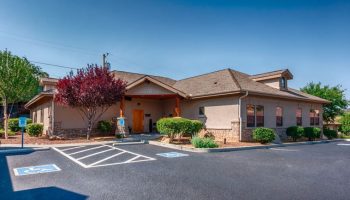Little Colorado Behavioral Health Center Springerville
About Little Colorado Behavioral Health Center Springerville
Little Colorado Behavioral Health Center’s Springerville location is an outpatient rehab center. Despite the name, they’re based in Springerville, Arizona. They’re a short drive from Little Colorado River and the Apache-Sitgreaves National Forests to give you ample opportunity to immerse yourself in nature as a sober habit or as part of your stress management techniques.
They offer medication-assisted treatment using methadone, buprenorphine, and naltrexone. If you’re already taking prescription medication for opioid use disorder, they’re able to supplement your treatment with addiction talk therapy.
Prioritization of Accessibility
It’s important to them that treatment is accessible to as many people as possible. They offer all services in English and Spanish and have sign language services for the hard of hearing. You can easily get a walk-in psychiatric appointment or crisis intervention services if you need help in an emergency.
They offer treatment for people of any age or stage of life. Some notable age groups include children under the age of 17, older adults above the age of 65, and young adults between the ages of 18 and 21.
Unique Therapy to Approach Recovery from Different Angles
Little Colorado Behavioral Health Center tackles recovery from multiple angles with common and uncommon therapy methodologies, including one called rational emotive behavioral therapy. This method challenges deep-seated beliefs and irrational thought patterns which enable substance use. With time, you learn to replace unhelpful behaviors with ones that support your recovery goal.
Another method is called contingency management or motivational incentives. It’s a process where you’re rewarded for evidence of positive progress. Depending on your care approach, you’ll develop treatment goals and appropriate rewards individually, with your family, or with your entire care team.
| Levels of Care | Detox Service Setting | Programs | Payment Options | ||
|---|---|---|---|---|---|
|
In outpatient therapy, you’ll attend therapy sessions several times each week while living at home. This is ideal if you have a strong support system and a lower risk of relapse. Outpatient treatment offers flexibility to maintain work, school or family obligations. |
Dual diagnosis programs address substance use disorders and co-occurring mental health conditions simultaneously. This integrated approach to care improves the likelihood of long term recovery and stability by addressing the root causes of addiction. |
||||
|
Outpatient detox gives you access to medically supervised withdrawal services while still allowing you to live at home. You’ll attend a clinic for treatment and monitoring. This flexible option is suitable for those with mild to moderate withdrawal symptoms who have strong support systems. |
|||||
|
Adult programs address the substance use and life challenges specific to adults. Therapists can deliver sessions in individual, group and family settings. Services often include job support and life skills training in a structured environment. |
Alcohol detox programs offer medical support to help individuals withdraw safely from alcohol. Your care team may use medications to ease your symptoms and provide medical monitoring to address complications. |
Cognitive behavioral therapy focuses on changing harmful thought patterns and behaviors associated with addiction. You’ll learn healthier coping mechanisms by identifying and replacing negative thoughts. This improves your emotional resilience and decreases your relapse potential. |
Opioid detox uses medications to ease severe withdrawal symptoms. It also includes medical supervision to help you manage potential complications. These services allow you to stabilize and begin a recovery plan. |
Senior programs address the unique needs of older adults like chronic pain, grief and isolation. Programs include peer support and medical oversight for age related health concerns. The goal is to improve quality of life and promote sober aging. |
Young adult programs are designed for individuals who are transitioning into adulthood. Topics of discussion typically include identity, independence and peer relationships. Providers may also offer life skills training and career support. |
|
Medicaid
|
Medicare
|
Military Insurance
|
Private Insurance
|
Self Pay
|
Levels of Care
In outpatient therapy, you’ll attend therapy sessions several times each week while living at home. This is ideal if you have a strong support system and a lower risk of relapse. Outpatient treatment offers flexibility to maintain work, school or family obligations.
Dual diagnosis programs address substance use disorders and co-occurring mental health conditions simultaneously. This integrated approach to care improves the likelihood of long term recovery and stability by addressing the root causes of addiction.
Detox Service Setting
Outpatient detox gives you access to medically supervised withdrawal services while still allowing you to live at home. You’ll attend a clinic for treatment and monitoring. This flexible option is suitable for those with mild to moderate withdrawal symptoms who have strong support systems.
Programs
Adult programs address the substance use and life challenges specific to adults. Therapists can deliver sessions in individual, group and family settings. Services often include job support and life skills training in a structured environment.
Alcohol detox programs offer medical support to help individuals withdraw safely from alcohol. Your care team may use medications to ease your symptoms and provide medical monitoring to address complications.
Cognitive behavioral therapy focuses on changing harmful thought patterns and behaviors associated with addiction. You’ll learn healthier coping mechanisms by identifying and replacing negative thoughts. This improves your emotional resilience and decreases your relapse potential.
Opioid detox uses medications to ease severe withdrawal symptoms. It also includes medical supervision to help you manage potential complications. These services allow you to stabilize and begin a recovery plan.
Senior programs address the unique needs of older adults like chronic pain, grief and isolation. Programs include peer support and medical oversight for age related health concerns. The goal is to improve quality of life and promote sober aging.
Young adult programs are designed for individuals who are transitioning into adulthood. Topics of discussion typically include identity, independence and peer relationships. Providers may also offer life skills training and career support.




